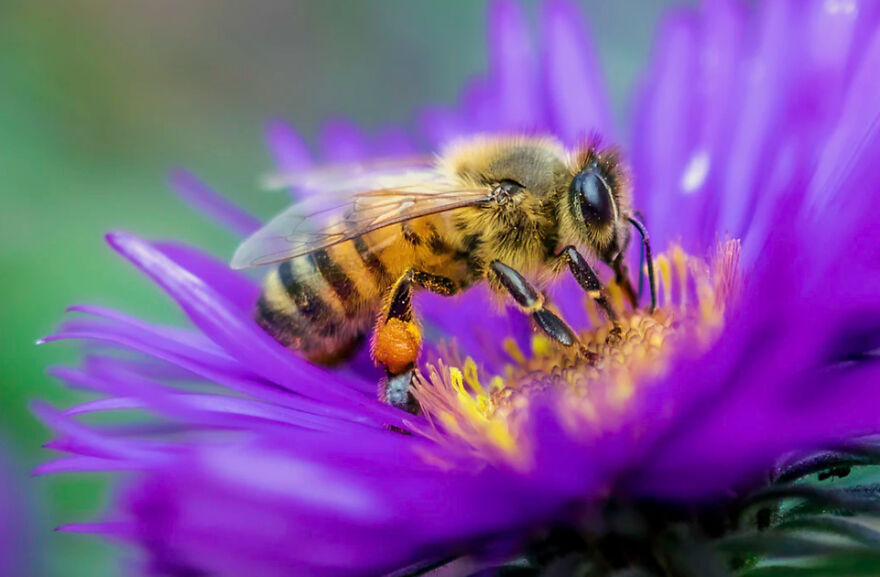Bees, The Most Necessary Creature Known To Man.
Posted May 20, 2022
Today, in honor of World Bee Day, we should all plant a flower or tomato plant in our gardens. Maybe, have a cup of tea with honey or bake some honey cookies to share with family and friends… or better yet, take some to a homeless shelter or nursing home to share with the less fortunate and elderly.
We should feel fortunate that we have honey to make those cookies or enjoy that tea… You see, over the last decade or so, the bee population has been in serious trouble and that means devastation for humans when food sources start to dry up. Honeybees are key to the survival of man and beast. They are the major pollinators in our ecosystem and without them. Many plant eaters would simply starve, then without those plant-eaters, the meat-eaters would also be in jeopardy of starvation. It can never be overstated that we eat because bees provide pollination to the flowers of all plants. Those little yellow flowers on your tomato plant… yep, pollinated by a bee or two.
IGNORANCE IS NOT BLISS
What many people don’t seem to know is that bees are responsible for the food we eat. And Chemical companies are creating and distributing pesticides that are decimating the bee population. Ya gotta hand it to man, just can’t share the earth with other species. It’s big business to create pesticides and fuel the pharmaceutical companies due to the rise in cancer from these toxic chemicals.
Bees make it possible for farmers and home gardeners to grow the very food we eat. Apples for instance need to be cross-pollinated. Humans could pollinate by hand but that can be tedious and time-consuming. Which isn’t practical when our friend the honeybee could just flit about from flower to flower doing the work for us. Can you imagine all the things we wouldn’t have if not for the humble honeybee? A world devoid of coffee, chocolate, berries, cherries and apples, acorn squash, pumpkins, tomatoes, even aspirin, and all of the nuts we love to eat like peanuts, macadamias, cashews… the list goes on.
Research shows that the worldwide global market has prospered thanks to the little honeybee, each year $235 billion in pollinated crops make their way around the globe feeding people along the way. If we lost all of the bees, we may not face total extinction but all along the food chain, there would be struggles finding food. I don’t know about you, but I’m not signing up for the second coming of the Donner Party.
THERE IS HOPE IF WE ALL WAKE UP NOW
In 2017, the United Nations established World Bee Day which was the brainchild of the Slovenian Beekeepers Association back in 2014. Now, every May 20th we need to keep the bees in our minds and realize how important they are to our own lives.
Author and president of the Slovenian Beekeeping Association – Bostjan Noč, says it is up to everyone to start listening to bees. Especially decision-makers and world leaders.
“I believe that – with the proclamation of World Bee Day – the world will begin to think more broadly about bees, in particular in the context of ensuring conditions for their survival, and thus for the survival of the human race.”
A PLACE OF THEIR OWN
Bee Hotels, as the Belgium beekeepers call them, started popping up in other places around the world as people started to realize the importance of this cute little winged creature, and a new hobby was born. While bees are the major contributor to the world of pollination, credit should go to other helpers in the animal and insect world. Hummingbirds, butterflies, beetles, moths, and even wasps play a part. They work as a team as they go around pollinating 80% of the plants around the world that we use for food, spices, and even medicine.
DANGER OF EXTINCTION
Many species are already extinct and lost to us forever. The Rusty Patched Bumble Bee was the first to be put on the endangered list in the 1990s. Managed hives are having a hard time with it as well. What with deadly viruses and pesticides our friend the bee is dying off in huge numbers. Of course, the murder hornets haven’t helped the already dire situation.
Friends of the earth has indicated that the honeybee family includes well over 20,000 bee species throughout the world. Of the 350 in Belgium and 270 in the UK, all are in managed colonies. The United States boasts 4000 species of native bees. The adorable black and yellow bumblebee and the little sweat bee aren’t aggressive stingers. They just mind their own business doing what they do best.
GMOS ARE NOT OUR FRIEND
A new scientific study is looking into whether GMO crops have any significance in the collapse of entire colonies of bees. So, man is his own worst enemy with GMOs and he is taking the only lifesaving partner down with him. Developers see meadows and fields and get dollar signs in their eyes in terms of concrete jungles of stores and factories and overpriced housing. This is leaving our bee families searching for new homes themselves. The genetically modified farm is not only killing off the bees but creating produce that is lacking essential nutrition that is necessary for our bodies to function. All they are creating are stomach fillers.
A GREAT FOOD SOURCE
It is a fact that Dandelions are not weeds, but still, homeowners try to maintain a meticulous lawn, and they are inadvertently cutting off a food source for bees and other friendly insects and animals. Your “harmless” weed killer not only snuffs out the useful plant, but it takes out the bees. Dandelions are used in herbal medicine and culinary dishes. Try Dandelion leaves in your salad, very similar to Arugula.
FOR A SMALL DONATION TO PLANET BEE, YOU CAN GET A FREE BEE SAVER KIT
https://www.planetbee.org/backyard-beekeeping Whether you live in the UK or the US or anywhere else in the world, bees are worthy of our help. Even though the lovely bee is an essential part of the ecosystem, they are struggling to survive. What with climate change and pesticides, loss of their natural habitat, and human ignorance, their numbers are declining, and man is to blame. Bees are having their biological clocks go haywire.
They are coming out of hibernation state too early when it appears to be spring and then the temperature plummets. They are dying as they use up energy to keep their body temperatures regulated.
We humans need to change our mindset about nature and the climate crisis. No longer can we bury our heads in the sand and pretend it’s not happening. We are the reason for nature’s demise. We hold the answers to fixing things before it becomes too late and we end up in a “Total Recall” version of Earth.
So, how can we help the bees you ask? First, plant pollen-friendly plants and flowers in and around your house and garden. Second, make a Bee Condo near your garden. And third, make a natural pesticide like citronella to keep the real pests away like mosquitos. Don’t opt for the toxic versions that can harm you, your family, and nature itself.
HERE ARE SOME SUGGESTIONS:
Vegetable Oil Mixed with Mild Liquid Soap in A Spray Bottle
Castile Liquid Soap in A Spray Bottle Mix with Water or Witch Hazel
Oil Of Oregano In A Spray Bottle
Diatomaceous Earth
Chili Pepper Spray
FOR THE GENERATIONS BEHIND US
The world should be celebrating these prolific pollinators, not murdering them out of insect fear. How can a big burly human be afraid of a cute little bee? European countries are so far ahead of the US in terms of taking steps to save the bee populations in their homelands. We should take a page from their playbook.
A designer in the Netherlands created self-sustaining artificial flowers with a 3D printer. In Holland, they grow gardens on the roof of bus stop shelters… What an ingenious innovation. And the UK has Friends of the Earth. If we all just did small changes, we could not only save the vital bee population but might also save the only planet with life-sustaining possibilities. We need to realize that even the smallest change can and will have a big impact on our future here on earth. And let’s face it, Mars is not an option.
More info: herbalhealthwriter.com
A Beautiful Bee – @dustinhumes_photography
Posted May 20, 2022
Today, in honor of World Bee Day, we should all plant a flower or tomato plant in our gardens. Maybe, have a cup of tea with honey or bake some honey cookies to share with family and friends… or better yet, take some to a homeless shelter or nursing home to share with the less fortunate and elderly.
We should feel fortunate that we have honey to make those cookies or enjoy that tea… You see, over the last decade or so, the bee population has been in serious trouble and that means devastation for humans when food sources start to dry up. Honeybees are key to the survival of man and beast. They are the major pollinators in our ecosystem and without them. Many plant eaters would simply starve, then without those plant-eaters, the meat-eaters would also be in jeopardy of starvation. It can never be overstated that we eat because bees provide pollination to the flowers of all plants. Those little yellow flowers on your tomato plant… yep, pollinated by a bee or two.
IGNORANCE IS NOT BLISS
What many people don’t seem to know is that bees are responsible for the food we eat. And Chemical companies are creating and distributing pesticides that are decimating the bee population. Ya gotta hand it to man, just can’t share the earth with other species. It’s big business to create pesticides and fuel the pharmaceutical companies due to the rise in cancer from these toxic chemicals.
Bees make it possible for farmers and home gardeners to grow the very food we eat. Apples for instance need to be cross-pollinated. Humans could pollinate by hand but that can be tedious and time-consuming. Which isn’t practical when our friend the honeybee could just flit about from flower to flower doing the work for us. Can you imagine all the things we wouldn’t have if not for the humble honeybee? A world devoid of coffee, chocolate, berries, cherries and apples, acorn squash, pumpkins, tomatoes, even aspirin, and all of the nuts we love to eat like peanuts, macadamias, cashews… the list goes on.
Research shows that the worldwide global market has prospered thanks to the little honeybee, each year $235 billion in pollinated crops make their way around the globe feeding people along the way. If we lost all of the bees, we may not face total extinction but all along the food chain, there would be struggles finding food. I don’t know about you, but I’m not signing up for the second coming of the Donner Party.
THERE IS HOPE IF WE ALL WAKE UP NOW
In 2017, the United Nations established World Bee Day which was the brainchild of the Slovenian Beekeepers Association back in 2014. Now, every May 20th we need to keep the bees in our minds and realize how important they are to our own lives.
Author and president of the Slovenian Beekeeping Association – Bostjan Noč, says it is up to everyone to start listening to bees. Especially decision-makers and world leaders.
“I believe that – with the proclamation of World Bee Day – the world will begin to think more broadly about bees, in particular in the context of ensuring conditions for their survival, and thus for the survival of the human race.”
A PLACE OF THEIR OWN
Bee Hotels, as the Belgium beekeepers call them, started popping up in other places around the world as people started to realize the importance of this cute little winged creature, and a new hobby was born. While bees are the major contributor to the world of pollination, credit should go to other helpers in the animal and insect world. Hummingbirds, butterflies, beetles, moths, and even wasps play a part. They work as a team as they go around pollinating 80% of the plants around the world that we use for food, spices, and even medicine.
DANGER OF EXTINCTION
Many species are already extinct and lost to us forever. The Rusty Patched Bumble Bee was the first to be put on the endangered list in the 1990s. Managed hives are having a hard time with it as well. What with deadly viruses and pesticides our friend the bee is dying off in huge numbers. Of course, the murder hornets haven’t helped the already dire situation.
Friends of the earth has indicated that the honeybee family includes well over 20,000 bee species throughout the world. Of the 350 in Belgium and 270 in the UK, all are in managed colonies. The United States boasts 4000 species of native bees. The adorable black and yellow bumblebee and the little sweat bee aren’t aggressive stingers. They just mind their own business doing what they do best.
GMOS ARE NOT OUR FRIEND
A new scientific study is looking into whether GMO crops have any significance in the collapse of entire colonies of bees. So, man is his own worst enemy with GMOs and he is taking the only lifesaving partner down with him. Developers see meadows and fields and get dollar signs in their eyes in terms of concrete jungles of stores and factories and overpriced housing. This is leaving our bee families searching for new homes themselves. The genetically modified farm is not only killing off the bees but creating produce that is lacking essential nutrition that is necessary for our bodies to function. All they are creating are stomach fillers.
A GREAT FOOD SOURCE
It is a fact that Dandelions are not weeds, but still, homeowners try to maintain a meticulous lawn, and they are inadvertently cutting off a food source for bees and other friendly insects and animals. Your “harmless” weed killer not only snuffs out the useful plant, but it takes out the bees. Dandelions are used in herbal medicine and culinary dishes. Try Dandelion leaves in your salad, very similar to Arugula.
FOR A SMALL DONATION TO PLANET BEE, YOU CAN GET A FREE BEE SAVER KIT
https://www.planetbee.org/backyard-beekeeping Whether you live in the UK or the US or anywhere else in the world, bees are worthy of our help. Even though the lovely bee is an essential part of the ecosystem, they are struggling to survive. What with climate change and pesticides, loss of their natural habitat, and human ignorance, their numbers are declining, and man is to blame. Bees are having their biological clocks go haywire.
They are coming out of hibernation state too early when it appears to be spring and then the temperature plummets. They are dying as they use up energy to keep their body temperatures regulated.
We humans need to change our mindset about nature and the climate crisis. No longer can we bury our heads in the sand and pretend it’s not happening. We are the reason for nature’s demise. We hold the answers to fixing things before it becomes too late and we end up in a “Total Recall” version of Earth.
So, how can we help the bees you ask? First, plant pollen-friendly plants and flowers in and around your house and garden. Second, make a Bee Condo near your garden. And third, make a natural pesticide like citronella to keep the real pests away like mosquitos. Don’t opt for the toxic versions that can harm you, your family, and nature itself.
HERE ARE SOME SUGGESTIONS:
Vegetable Oil Mixed with Mild Liquid Soap in A Spray Bottle
Castile Liquid Soap in A Spray Bottle Mix with Water or Witch Hazel
Oil Of Oregano In A Spray Bottle
Diatomaceous Earth
Chili Pepper Spray
FOR THE GENERATIONS BEHIND US
The world should be celebrating these prolific pollinators, not murdering them out of insect fear. How can a big burly human be afraid of a cute little bee? European countries are so far ahead of the US in terms of taking steps to save the bee populations in their homelands. We should take a page from their playbook.
A designer in the Netherlands created self-sustaining artificial flowers with a 3D printer. In Holland, they grow gardens on the roof of bus stop shelters… What an ingenious innovation. And the UK has Friends of the Earth. If we all just did small changes, we could not only save the vital bee population but might also save the only planet with life-sustaining possibilities. We need to realize that even the smallest change can and will have a big impact on our future here on earth. And let’s face it, Mars is not an option.
More info: herbalhealthwriter.com





3
0